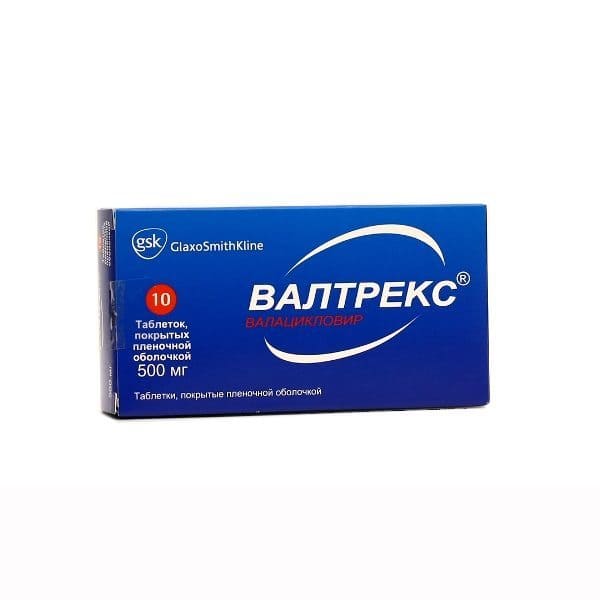You have no items in your shopping cart.

Sku:
pharmachologic effect
Valacyclovir is an antiviral agent, it is an L-valine ester of acyclovir. Acyclovir is an analogue of a purine nucleoside (guanine).
In the human body, valaciclovir is rapidly and almost completely converted into acyclovir and valine, presumably under the influence of the enzyme valacyclovirhydrolase.
Acyclovir is a specific inhibitor of herpes viruses with in vitro activity against Herpes simplex virus types 1 and 2, Varicella zoster virus, Varicella zoster, cytomegalovirus (CMV), Epstein-Barr virus (VEB) and virus herpes simplex type 6. Acyclovir inhibits the synthesis of viral DNA immediately after phosphorylation and conversion into an active form - acyclovir triphosphate.
The first stage of phosphorylation requires the activity of virus-specific enzymes. For HSV, VZV and VEB, this enzyme is viral thymidine kinase, which is present only in the cells infected with the virus. Partially, the selectivity of phosphorylation is maintained in the cytomegalovirus indirectly through the product of the phosphotransferase UL97 gene. This need to activate acyclovir with a specific viral enzyme largely explains its selectivity. The process of phosphorylation of acyclovir (conversion from mono- to triphosphate) is completed by cellular kinases.
Acyclovir triphosphate competitively inhibits viral DNA polymerase and, being an analogue of a nucleoside, is inserted
into viral DNA, which leads to an obligate rupture of the chain, stopping the synthesis of DNA and, consequently, to blocking the replication of the virus.
Resistance to acyclovir is usually due to a deficiency of thymidine kinase, which leads to an excessive spread of the virus in the host. In rare cases, a decrease in sensitivity to acyclovir is due to the appearance of strains of the virus with a violation of the structure of viral thymidine kinase or DNA polymerase. The virulence of these varieties of the virus resembles that of its wild strain.
Based on the results of an extensive study of HSV and VZV strains selected from patients treated with acyclovir or used for prevention, it was found that viruses with reduced sensitivity to valacyclovir are extremely rare, but can be detected in rare cases in patients with severe immunity, for example, bone marrow transplant recipients or organ, patients receiving chemotherapy for malignant neoplasms, and in HIV-infected patients.
Valaciclovir contributes to the relief of pain syndrome: reduces its duration and reduces the percentage of patients with pain caused by herpes zoster, including acute postherpetic neuralgia.
Indications
Adults and adolescents aged 12 to 18 years
- treatment of infections of the skin and mucous membranes caused by HSV, including the newly identified and recurring genital herpes (Herpes genitalis), as well as the labial herpes (Herpes labialis);
- prevention (suppression) of recurrences of infections of the skin and mucous membranes caused by HSV, including genital herpes, incl. in adults with immunodeficiency;
- Prevention of infections caused by cytomegalovirus (CMV), and
diseases after transplantation of parenchymal organs.
Adults
- Treatment of herpes zoster (Herpes zoster) and ophthalmic herpes zoster.